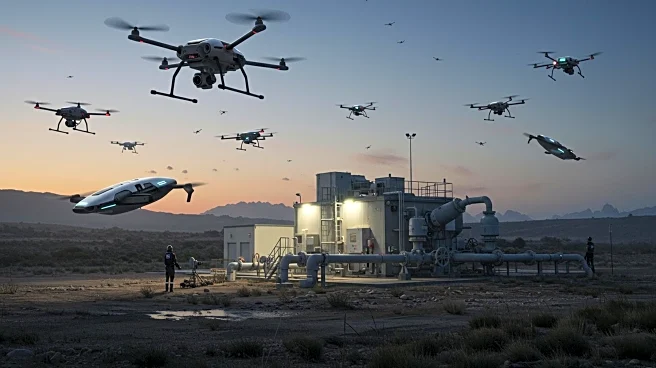What is the story about?
What's Happening?
Ukraine has conducted another drone strike on Russia's largest oil pumping station, part of the Druzhba pipeline system, located in Unecha, Bryansk region. This attack, carried out by the Ukrainian Unmanned Systems Forces, has reportedly halted the supply of crude oil to Hungary. The Unecha station is a critical hub in the Druzhba pipeline, which spans 9,000 kilometers and is essential for Russia's military-industrial complex. Hungarian Foreign Minister Péter Szijjártó expressed concern over the repeated attacks, labeling them as threats to Hungary's energy security and potential provocations to involve Hungary in the ongoing conflict. Previous strikes on Russian infrastructure have resulted in significant economic losses, estimated at $74.11 billion, impacting oil and gas facilities primarily.
Why It's Important?
The disruption of oil supply to Hungary underscores the broader geopolitical tensions and economic ramifications of the conflict between Ukraine and Russia. Hungary, reliant on the Druzhba pipeline for energy, faces potential energy shortages, which could affect its economy and political stability. The strikes highlight Ukraine's strategic use of drone technology to target critical infrastructure, aiming to weaken Russia's economic and military capabilities. This development may influence international relations, as countries dependent on Russian energy might reassess their alliances and energy strategies. The economic impact on Russia, with losses amounting to 4% of its GDP, could pressure the Kremlin to reconsider its military actions.
What's Next?
Hungary may seek alternative energy sources or diplomatic solutions to mitigate the impact of the disrupted oil supply. The international community might increase pressure on Russia to resolve the conflict, potentially leading to negotiations or sanctions. Ukraine is likely to continue its strategy of targeting Russian infrastructure, aiming to further weaken Russia's economic position. The ongoing strikes could lead to heightened military responses from Russia, escalating the conflict further. Stakeholders, including European nations and energy companies, will closely monitor the situation to adapt their policies and strategies.
Beyond the Headlines
The repeated strikes on the Druzhba pipeline raise ethical and legal questions about the use of drones in warfare and the targeting of civilian infrastructure. The conflict's impact on global energy markets could lead to long-term shifts in energy policies, with countries seeking to diversify their energy sources to reduce dependency on Russian oil. The situation also highlights the vulnerability of critical infrastructure in modern warfare, prompting discussions on enhancing security measures and resilience against such attacks.














